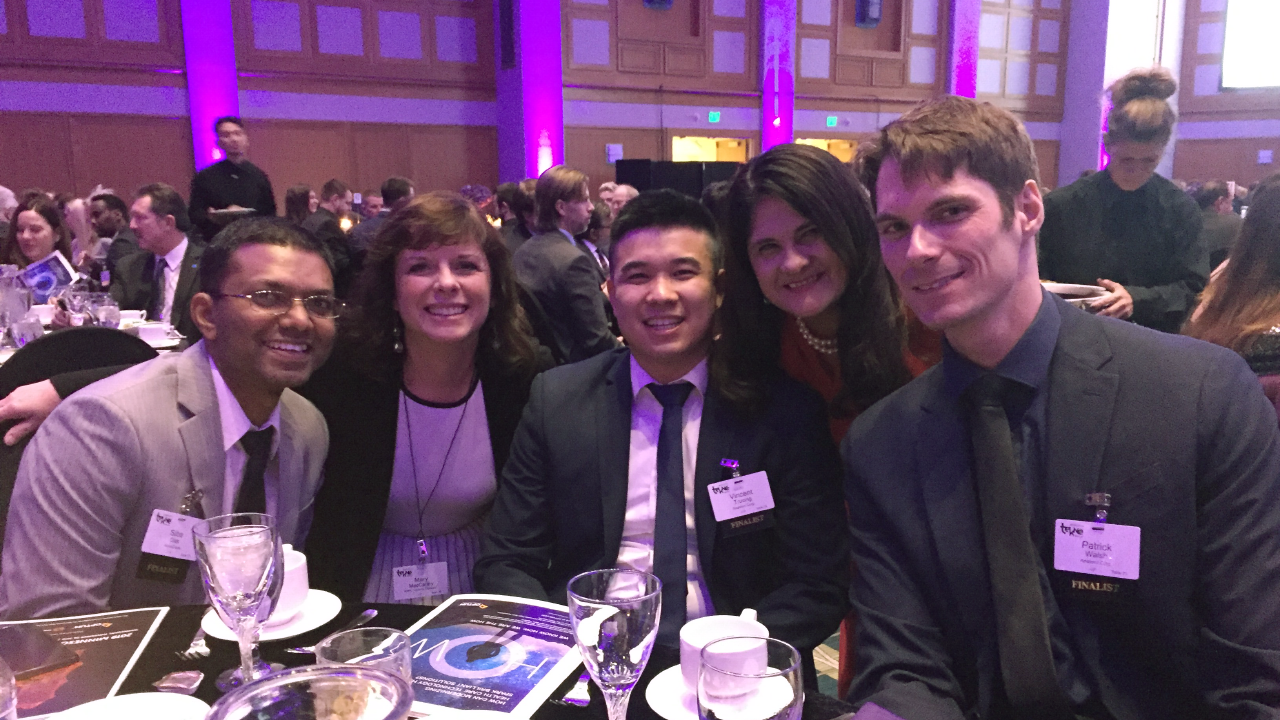
From left: Siba Das (NovoClade), Mary MacCarthy (UMN Venture Center), Vincent Truong (Anatomi), Pat Dillon (MHTA), and Patrick Walsh (Anatomi) at the 2019 Tekne Awards Gala.
Three startup companies based on University of Minnesota research received awards this week from the Minnesota High Tech Association.
At a November 20 awards gala, U startups Anatomi and Calyxt received Tekne Awards, which shine a spotlight on Minnesota’s science and technology community by honoring innovation across numerous industries. In addition, NovoClade won a Small Business Innovation Research Honoree award.
Learn more about these startups, launched through U of M Technology Commercialization’s Venture Center, below.
Anatomi
Minneapolis-based Anatomi, launched in May, promotes the discovery of new treatments for neurological diseases such as Alzheimer’s, Parkinson’s, and ALS.
The startup develops tools for manufacturing human neurons from stem cells in a faster and more efficient way than previous methods allow. Scientists use lab-grown human neurons to accurately model neurodegenerative disease processes in a laboratory setting.
Anatomi’s technology provides a way to make these neurons from the stem cells of a person with a neurological disease, allowing scientists to understand how the disease works in a patient-specific way. The technology stands to help accelerate pharmaceutical discovery and better leverage the potential of developmental neuroscience across a variety of scientific fields.
Patrick Walsh, Anatomi’s CEO, and Vincent Truong developed the technology behind Anatomi while performing experimentation in the laboratories of James Dutton, PhD, associate professor of genetics, cell biology and development in the College of Biological Sciences and the Stem Cell Institute, and Ann M. Parr, MD, PhD, associate professor of neurosurgery in the Medical School and Stem Cell Institute.
Anatomi participated in the Venture Center’s Discovery Launchpad startup incubator, which provides expert coaching and support for researchers looking to bring discoveries beyond the lab and into the marketplace through the launch of a new company. The startup also received a Regenerative Medicine Minnesota Biobusiness grant earlier this year.
Calyxt
Calyxt, launched in 2011 and based in Roseville, MN, uses a gene editing technology known as TALENs to develop healthier and more resilient crops.
Using TALENs as a set of “molecular scissors,” Calyxt makes pinpoint changes to specific genes that lead to more desirable traits in plants. The process does not involve introducing DNA from other plant species, so the crop is not considered a genetically modified organism (GMO). Instead, the process is similar to the natural mutations that happen to plants in the wild and mimics the effects of farmers’ traditional plant breeding methods—only with greater precision and over a much shorter time span.
The company launched its first product early this year, a high-oleic soybean oil that contains no trans fat and has up to 20 percent less saturated fat than typical soybean oil, along with a longer shelf life.
Calyxt was founded by the two researchers who invented the TALENs technology: Daniel Voytas, PhD, professor of genetics, cell biology, and development in the College of Biological Sciences and director of its Center for Precision Plant Genomics, and Feng Zhang, PhD, assistant professor of plant and microbial biology. The company went public in 2017.
NovoClade
NovoClade, a St. Paul-based synthetic biology company launched in July, aims to control mosquito populations and their role in spreading disease.
The company’s gene editing technology can create a line of “sterile” mosquitoes from which only the male offspring will survive. Since only female mosquitoes bite humans, this lowers the number of insects around to transmit diseases. Unlike existing insect management efforts, which rely on toxic chemicals and are not species-specific, NovoClade’s technology targets only mosquitoes, sparing other species any harmful effects.
NovoClade was founded by a team of researchers from the U’s College of Biological Sciences and College of Food, Agricultural, and Natural Resource Sciences: Siba Das, PhD, senior research scientist at the BioTechnology Institute (BTI) and the Minnesota Aquatic Invasive Species Research Center who is also NovoClade’s president and CEO; Maciej Maselko, PhD, previously a postdoctoral scholar at BTI and now a lecturer at Australia’s Macquarie University; Michael Smanski, Ph.D., assistant professor of biochemistry; and Perry Hackett, PhD, professor of genetics, cell biology, and development.
The startup was awarded a Phase 1 SBIR grant this year and was named a finalist in the 2019 MN Cup awards. NovoClade was also named a winner in last December’s Walleye Tank business pitch competition.
MHTA 2019 Scholarship Recipients
Also during the Tekne Awards event, three U of M undergraduate students were recognized among MHTA's 2019 scholarship recipients:
- Kinza Ahmed, computer science, College of Science and Engineering (CSE), U of M Twin Cities
- Hassen Jama, industrial and systems engineering, CSE, U of M Twin Cities
- Terrance Scheele, electrical engineering, Swenson College of Science and Engineering, U of M Duluth